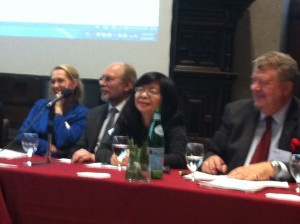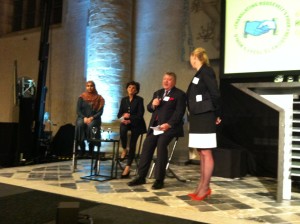The links are listed below:
The podcast of the proceedings (as on The Sydney Institute’s website): http://thesydneyinstitute.com.
Dr Ozdowski’s address: 2016-03-11 AUSTRALIAN MULTICULTURALISM – ADDRESS TO THE SYDNEY INSTITUTE – Final
The links are listed below:
The podcast of the proceedings (as on The Sydney Institute’s website): http://thesydneyinstitute.com.
Dr Ozdowski’s address: 2016-03-11 AUSTRALIAN MULTICULTURALISM – ADDRESS TO THE SYDNEY INSTITUTE – Final
Today’s High Court decision entrenched the legal basis for off-shore processing of asylum seekers and this decision cannot be ignored. Central to the decision was a retrospective amendment to the Migration Act which was passed by the Australian Parliament shortly after the case was initiated and which validated the offshore processing of asylum seekers.
The High Court ruling threatens to inflict further damage to already traumatized 267 people, including up to 80 children, who are currently in Australia but are at risk of being transferred to Nauru following the High Court’s decision. Most of these people were reportedly brought to Australia from Nauru to receive medical treatment and are in a fragile physical and mental state. The group includes more than 12 women and at least one child who have allegedly suffered sexual assault or harassment while in Nauru. The group also includes 37 children born in Australia.
I am particularly concerned that implementation of the High Court decision and sending these children to Nauru could contravene Australia’s obligations under the Convention on the Rights of the Child. Australia is signatory to this convention and children, regardless of their legal status, have the right to be treated as children first and foremost, and the best interests of the child takes precedence over migration management or administrative considerations. For more see my 2004 report at: https://www.humanrights.gov.au/our-work/asylum-seekers-and-refugees/projects/last-resort-report-national-inquiry-children
It is time to exercise compassion. I therefore urge the Australian Government to refrain from transferring all concerned individuals to Nauru.https://www.humanrights.gov.au/our-work/asylum-seekers-and-refugees/projects/last-resort-report-national-inquiry-children
I was delighted to be appointed in the Australia Day Honours list as a Member of the Order of Australia for “for significant service to the community, particularly to human rights education, social justice and multiculturalism, and as an academic”. Thank you very much for many kind wishes and congratulations I have received. In fact, I am thrilled and all wonderful, unanticipated emails and telephone calls have really enriched the whole AM experience.
While I am grateful and honoured personally, more important to me is that this award acknowledges the importance of human rights and multicultural Australia and all those who toil to advance these ideals. So my particular thanks go to all who have worked with me on human rights education, and in particular to members of the Australian Council for Human Rights Education http://www.humanrightseducationaustralia.com/about.php and to those who have helped me to organise past six International Human Rights Education conferences http://www.westernsydney.edu.au/equity_diversity/equity_and_diversity/conferences/international_human_rights_education_conferences.
Thank you also to my co-workers on the Australian Multicultural Council (https://www.dss.gov.au/our-responsibilities/settlement-and-multicultural-affairs/programs-policy/a-multicultural-australia/australian-multicultural-council) and to all who worked to advance Australia as just and fair multicultural society with opportunities open to all.
Honours such as these carry with them humbling obligations which I will pursue with renewed energy in all my endeavours.
I have just returned from the 6th International Human Rights Conference titled ‘Translating Roosevelt’s Four Freedoms to Today’s World’ that was held at the University College Roosevelt in Middelburg, The Netherlands, between 17-19 December 2015.
I am pleased to report that the conference was a great success. It was attended by over 300 people from some 40 countries. The Conference was opened by Dr JMM Polman, King’s Commissioner of Zeeland, Dr Jet Bussemaker, Dutch Minister of Education, Culture and Science and Dr Morten Kjaerum, Head, Raoul Wallenberg Institute of Human Rights and Humanitarian Law. I, as the Foundation Convenor and IHREC Series Coordinator, delivered the opening and closing remarks and chaired two sessions. My opening remarks are attached. To view the conference website and the Middelburg Declaration that resulted from the Conference – please visit http://www.ihrec2015.org/. Please find also attached the Conference Program and the opening speech by the President, ACHRE, Dr Sev Ozdowski OAM.
I have also been hosted in The Hague by Sir David Baragwanath, the second longest serving New Zealand High Court Judge and now Appellate Judge at The united Nations Special Tribunal for Lebanon and attended the session of the Tribunal.
The next conference (7th IHREC) will be hosted by the Faculty of Law, Universidad de Chile in Santiago, Chile on 12 – 15 December 2016 (initial flyer attached). Planning is also well underway for the 2017 conference to be hosted by the Equitas, International Centre for Human Rights Education, Montreal, Canada.
The conference series will return to Western Sydney University in November 2018 which will coincide with the commemoration of the 70th anniversary of the United Nation’s Universal Declaration of Human Rights. The Australian initiative to organise this conference series, and the conference returning to Australia in 2018, offers a great opportunity to be showcased in an Australian bid for a seat at the United Nations Human Rights Council.
2015-12-17 6TH IHRE OPENING REMARKS BY SEV OZDOWSKI – final for publishing
111 IHREC2015 Conference booklet – final


It was a pleasure to be invited to speak at the unveiling of migrant names ceremony at the Welcome Wall of the Australian National Maritime Museum in Darling Harbour. It is important to keep the migrant history of Australia.
https://vimeo.com/151465832
My speech is below:
The Jury’s citation reads:
“George Gittoes AM: For exposing injustice for over 45 years as a humanist artist, activist and filmmaker, for his courage to witness and confront violence in the war zones of the world, for enlisting the arts to subdue aggression and for enlivening the creative spirit to promote tolerance, respect and peace with justice. ”
Gittoes grew up in the Sydney suburb of Rockdale and studied Fine Arts at The University of Sydney. In 1970 he helped establish The Yellow House artists collective in Kings Cross with others including Martin Sharp and Brett Whitely. Gittoes’ activism evolved through his work as a painter, film maker and photojournalist. He has chronicled conflicts and social upheavals in places including Nicaragua, Somalia, Cambodia, Western Sahara, Northern Ireland, Bosnia,Bougainville, East Timor, South Africa, Palestine, Iraq and Pakistan. In 1995 Gittoes was a witness to the massacre of thousands of Rwandans at a displaced persons camp where they had sought protection from UN peacekeeping forces. This inspired his painting The Preacher, which won the 1995 Blake Prize for religious art.
Congratulations again George!
The Federation of Ethnic Communities’ Councils of Australia (FECCA)’s held its national biennial conference entitled Multiculturalism in Action: Building a better future for all Australians
in Sydney on 5-6 November 2015. The Conference coincided with the 40th anniversary of ECC NSW and the SBS.
I was invited to speak on a panel which discussed the legacy of multiculturalism in Australia, particularly in relation to a potential case for a National Multicultural Act, on the first day of the conference. Few photos and a copy of my contribution are below.
FECCA Conference 2015 -Legislating Multiculturalism_- Dr Ozdowski
I met with Hon. M.A. Sumanthiran, Member of Parliament of Sri Lanka since 2010 representing Jaffna Electoral District and the official Spokesperson for the Tamil National Alliance (TNA) Party to discuss the current human rights situation in Sri Lanka.
Hon. Sumanthiran was educated Colombo, Madras and Melbourne and is one of Sri Lanka’s top human rights and constitutional lawyers. He has appeared in a number of fundamental rights cases and judicial reviews of parliamentary legislation and executive action including the charging of levy for water and establishing a revenue authority. He prevented the forced expulsion of Tamils from Colombo and successfully challenged an anti-conversion bill which the courts struck down as being unconstitutional. He has also appeared for petitioners against the proposed 18th and 19th amendments to the constitution which were found to be unconstitutional and required two-thirds majority in Parliament and a referendum. He has worked on a number of public interest cases including the on-going attempt by residents of the Valikamam North High Security Zone to get their land back from the Sri Lankan military. His human rights work has led to him being threatened and being branded “traitors in black coats” by the Sri Lankan military.
Hon. Sumanthiran is now working on the implementation of the recent UN Human Rights Council report: ‘Promoting reconciliation, accountability and human rights in Sri Lanka.’
It was a pleasure to host Mr Steve Killelea AM at the WSU Open Forum on: Positive Peace – What creates inclusiveness? Steve is an accomplished entrepreneur inhigh technology business development and his custemers include: Visa, Mastercard and American Express; stock exchanges in the New York, London and Hong Kong and most of the world’s ATM’s.
Steve has used his wealth to finance philanthropic activities focused on sustainable development and peace. He is the founder of the Institute for Economics and Peace https://en.wikipedia.org/wiki/Institute_for_Economics_and_Peace – an international think tank dedicated to building a greater understanding of the interconnection between business, peace and economics. The Global Peace Index study ( https://en.wikipedia.org/wiki/Global_Peace_Index ), launched in May 2007 attempts to rank the world’s nations’ and regions’ peacefulness. The Institute was recently ranked in the top 15 most impactful think tanks in the world on the Global Go to Think Tank Index.
The 2015 Global Terrorism Index will be released on 17 November. Now in its third year, the report provides a detailed analysis of the changing trends in terrorism across 162 countries, over the last 15 years. It investigates the patterns of terrorism by geographic activity, methods of attack, organisations involved and the national economic and political context. Socio-economic indicators are also analysed to determine the key underlying factors that have the closest statistical relationship to terrorism.
For more about the Institute for Economics and Peace (IEP) see the Attachment.